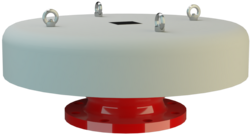LH/AD
Deflagration Flame Arrester, End-of-Line
- weather hood with protection screen protects the PROTEGO® flame arrester unit against environmental impact, such as nesting animals and weather conditions
- available for DN 50/2“- bis DN 800/32“- pipes
- trouble-free maintenance
- advanced design for higher operating temperatures
- provides protection against atmospheric deflagrations
- low operating and lifecycle costs
- cost-effective flame arrester
- cost-effective spare parts
Function and Description
The PROTEGO® LH/AD end-of-line deflagration flame arrester provides protection against flame transmission through atmospheric deflagration. The device is typically installed on vent lines of vessels and plant equipment which are not pressurized. For safe application, it is important that an endurance burning situation can be excluded. So typically, it is installed on vent lines which discharge vapor for a short time period. The device prevents flame transmission from atmospheric deflagration into the vessel or plant.
The PROTEGO® LH/AD consists of the housing (1), a weather hood (2), and the PROTEGO® flame arrester unit (3). The device is equipped with a metal weather hood. A protection screen is installed between the weather hood and the housing to keep out animals and foreign bodies. The FLAMEFILTER® (4) gap size depends on the device’s intended use. Specifying the operating conditions, such as the temperature, explosion group and the composition of the fluid, enables PROTEGO® to select the best end-of-line deflagration flame arrester for your application.
The PROTEGO® LH/AD series end-of-line deflagration flame arrester is available for substances from explosion groups IIA to IIC (NEC groups D to B). Special certifications for carbon disulfide are available.
The standard design can be used with an operating temperature of up to +60°C / 140°F. Devices with special approval for higher temperatures are available upon request.
EU conformity according to the currently valid ATEX directive. Approvals according to other national/international regulations on request.
Dimensions
To select the nominal size (DN), please use the flow capacity charts on the following pages
| DN | a | b | c* | c* |
| IIB3 | IIC | |||
| 50 / 2" | 100 / 3.94 | 200 / 7.87 | 175 / 6.89 | 185 / 7.28 |
| 80 / 3" | 150 / 5.91 | 240 / 9.45 | 180 / 7.09 | 195 / 7.68 |
| 100 / 4" | 200 / 7.87 | 295 / 11.61 | 220 / 8.66 | 235 / 9.25 |
| 150 / 6" | 300 / 11.81 | 550 / 21.65 | 260 / 10.24 | 270 / 10.63 |
| 200 / 8" | 300 / 11.81 | 550 / 21.65 | 260 / 10.24 | 270 / 10.63 |
| 250 / 10" | 400 / 15.75 | 600 / 23.62 | 355 / 13.98 | 365 / 14.37 |
| 300 / 12" | 400 / 15.75 | 600 / 23.62 | 340 / 13.39 | 350 / 13.78 |
| 350 / 14" | 600 / 23.62 | 800 / 31.50 | 390 / 15.35 | 400 / 15.75 |
| 400 / 16" | 600 / 23.62 | 800 / 31.50 | 380 / 14.96 | 390 / 15.35 |
| 500 / 20" | 700 / 27.56 | 1000 / 39.37 | 400 / 15.75 | 410 / 16.14 |
| 600 / 24" | 800 / 31.50 | 1200 / 47.24 | 475 / 18.70 | 485 / 19.09 |
| 700 / 28" | 1000 / 39.37 | 1400 / 55.12 | 505 / 19.88 | 515 / 20.28 |
| 800 / 32" | 1200 / 47.24 | 1600 / 62.99 | 550 / 21.65 | 560 / 22.05 |
Material selection for housing
| Design | A | B |
| Housing | Steel | Stainless Steel |
| Weather Hood | Stainless Steel | Stainless Steel |
| Protection screen | Stainless Steel | Stainless Steel |
| Flame arrester unit | A, B | B |
Material combinations of flame arrester unit
| Design | A | B |
| FLAMEFILTER® cage | Steel | Stainless Steel |
| FLAMEFILTER® | Stainless Steel | Stainless Steel |
Selection of explosion group
| MESG | Expl. Gr. (IEC / CEN) | Gas Group (NEC) |
| ≥ 0,65 mm | IIB3 | C |
| < 0,5 mm | IIC | B |
Specification of max. operating temperature
| ≤ 60°C / 140°F | Tmaximum allowable operating temperature in °C |
| - | Designation |
Flange connection type
| EN 1092-1; Form B1 |
| ASME B16.5 CL 150 R.F. |
Design Types and Specifications
Following designs are available:
Deflagration flame arrester, end-of-line, basic design | LH/AD |
Special designs available on request
Flow Capacity Chart


The flow capacity charts have been determined with a calibrated and TÜV certified flow capacity test rig. Volume flow V in (m³/h) and CFH refer to the standard reference conditions of air ISO 6358 (20°C, 1bar). For conversion to other densities and temperatures refer to Sec. 1: “Technical Fundamentals”.

